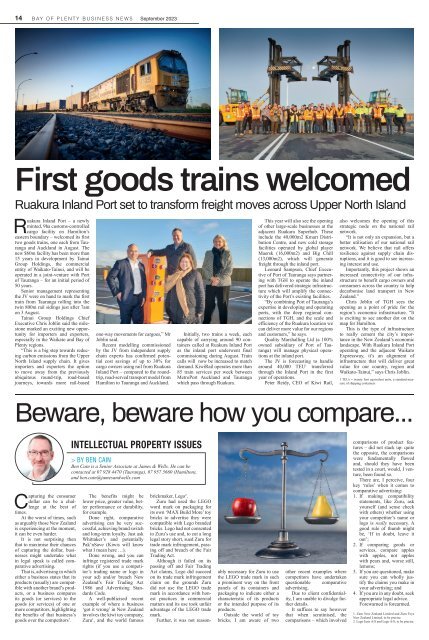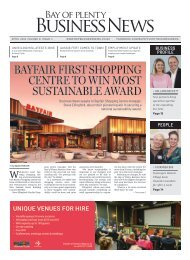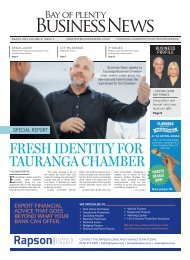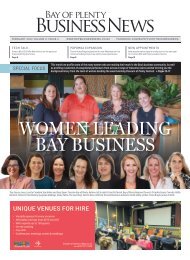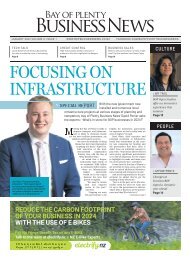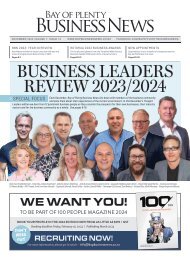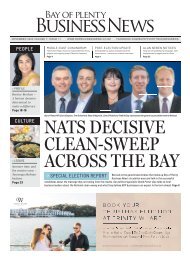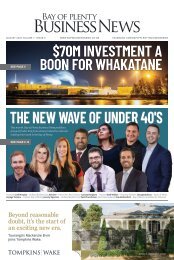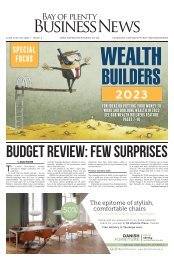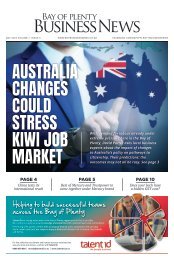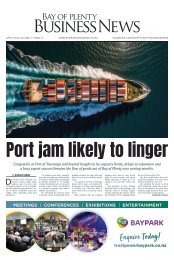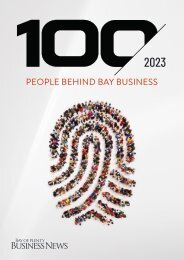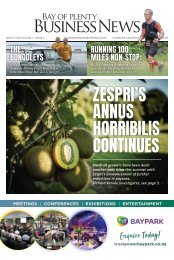September 2023 - Bay of Plenty Business News
From mid-2016 Bay of Plenty businesses have a new voice, Bay of Plenty Business News. This publication reflects the region’s growth and importance as part of the wider central North Island economy.
From mid-2016 Bay of Plenty businesses have a new voice, Bay of Plenty Business News. This publication reflects the region’s growth and importance as part of the wider central North Island economy.
You also want an ePaper? Increase the reach of your titles
YUMPU automatically turns print PDFs into web optimized ePapers that Google loves.
14 BAY OF PLENTY BUSINESS NEWS <strong>September</strong> <strong>2023</strong><br />
First goods trains welcomed<br />
Ruakura Inland Port set to transform freight moves across Upper North Island<br />
Ruakura Inland Port – a newly<br />
minted, 9ha customs-controlled<br />
cargo facility on Hamilton’s<br />
eastern boundary – welcomed its first<br />
two goods trains, one each from Tauranga<br />
and Auckland in August. The<br />
new $60m facility has been more than<br />
15 years in development by Tainui<br />
Group Holdings, the commercial<br />
entity <strong>of</strong> Waikato-Tainui, and will be<br />
operated in a joint-venture with Port<br />
<strong>of</strong> Tauranga – for an initial period <strong>of</strong><br />
50 years.<br />
Senior management representing<br />
the JV were on hand to mark the first<br />
train from Tauranga rolling into the<br />
twin 800m rail sidings just after 7am<br />
on 3 August.<br />
Tainui Group Holdings Chief<br />
Executive Chris Joblin said the milestone<br />
marked an exciting new opportunity<br />
for importers and exporters,<br />
especially in the Waikato and <strong>Bay</strong> <strong>of</strong><br />
<strong>Plenty</strong> regions.<br />
“This is a big step towards reducing<br />
carbon emissions from the Upper<br />
North Island supply chain. It gives<br />
importers and exporters the option<br />
to move away from the previously<br />
ubiquitous round-trip, road-based<br />
journeys, towards more rail-based<br />
one-way movements for cargoes,” Mr<br />
Joblin said.<br />
Recent modelling commissioned<br />
by the JV from independent supply<br />
chain experts has confirmed potential<br />
cost savings <strong>of</strong> up to 30% for<br />
cargo owners using rail from Ruakura<br />
Inland Port – compared to the roundtrip,<br />
road-served transport model from<br />
Hamilton to Tauranga and Auckland.<br />
Initially, two trains a week, each<br />
capable <strong>of</strong> carrying around 90 containers<br />
called at Ruakura Inland Port<br />
as the inland port underwent final<br />
commissioning during August. Train<br />
calls will now be increased to match<br />
demand. KiwiRail operates more than<br />
85 train services per week between<br />
MetroPort Auckland and Tauranga<br />
which pass through Ruakura.<br />
This year will also see the opening<br />
<strong>of</strong> other large-scale businesses at the<br />
adjacent Ruakura Superhub. These<br />
include the 40,000m2 Kmart Distribution<br />
Centre, and new cold storage<br />
facilities operated by global player<br />
Maersk (16,000m2) and Big Chill<br />
(13,000m2), which will generate<br />
freight through the inland port.<br />
Leonard Sampson, Chief Executive<br />
<strong>of</strong> Port <strong>of</strong> Tauranga says partnering<br />
with TGH to operate the inland<br />
port has delivered strategic infrastructure<br />
which will amplify the connectivity<br />
<strong>of</strong> the Port’s existing facilities.<br />
“By combining Port <strong>of</strong> Tauranga’s<br />
expertise in developing and operating<br />
ports, with the deep regional connections<br />
<strong>of</strong> TGH, and the scale and<br />
efficiency <strong>of</strong> the Ruakura location we<br />
can deliver more value for our regions<br />
and customers,” he says.<br />
Quality Marshalling Ltd (a 100%<br />
owned subsidiary <strong>of</strong> Port <strong>of</strong> Tauranga)<br />
will manage physical operations<br />
at the inland port.<br />
The JV is forecasting to handle<br />
around 40,000 TEU 1 transferred<br />
through the Inland Port in the first<br />
year <strong>of</strong> operations.<br />
Peter Reidy, CEO <strong>of</strong> Kiwi Rail,<br />
also welcomes the opening <strong>of</strong> this<br />
strategic node on the national rail<br />
network.<br />
“It is not only an expansion, but a<br />
better utilisation <strong>of</strong> our national rail<br />
network. We believe that rail <strong>of</strong>fers<br />
resilience against supply chain disruptions,<br />
and it is good to see increasing<br />
interest and use.<br />
Importantly, this project shows an<br />
increased connectivity <strong>of</strong> our infrastructure<br />
to benefit cargo owners and<br />
consumers across the country to help<br />
decarbonise land transport in New<br />
Zealand.”<br />
Chris Joblin <strong>of</strong> TGH sees the<br />
opening as a point <strong>of</strong> pride for the<br />
region’s economic infrastructure. “It<br />
is exciting to see another dot on the<br />
map for Hamilton.<br />
This is the type <strong>of</strong> infrastructure<br />
to really cement the city’s importance<br />
in the New Zealand’s economic<br />
landscape. With Ruakura Inland Port<br />
operating and the adjacent Waikato<br />
Expressway, it’s an alignment <strong>of</strong><br />
infrastructure that will deliver great<br />
value for our country, region and<br />
Waikato-Tainui,” says Chris Joblin.<br />
1 TEUs = twenty foot equivalent units, a standard measure<br />
<strong>of</strong> shipping containers<br />
Beware, beware how you compare...<br />
Capturing the consumer<br />
dollar can be a challenge<br />
at the best <strong>of</strong><br />
times.<br />
At the worst <strong>of</strong> times, such<br />
as arguably those New Zealand<br />
is experiencing at the moment,<br />
it can be even harder.<br />
It is not surprising then<br />
that to maximise their chances<br />
<strong>of</strong> capturing the dollar, businesses<br />
might undertake what<br />
in legal speak is called comparative<br />
advertising.<br />
That is, advertising in which<br />
either a business states that its<br />
products (usually) are compatible<br />
with another brand’s products,<br />
or a business compares<br />
its goods (or services) to the<br />
goods (or services) <strong>of</strong> one or<br />
more competitors, highlighting<br />
the benefits <strong>of</strong> that business’s<br />
goods over the competitors’.<br />
INTELLECTUAL PROPERTY ISSUES<br />
> BY BEN CAIN<br />
Ben Cain is a Senior Associate at James & Wells. He can be<br />
contacted at 07 928 4470 (Tauranga), 07 957 5660 (Hamilton),<br />
and ben.cain@jamesandwells.com<br />
The benefits might be<br />
lower price, greater value, better<br />
performance or durability,<br />
for example.<br />
Done right, comparative<br />
advertising can be very successful,<br />
achieving brand switch<br />
and long-term loyalty. Just ask<br />
Whittaker’s and potentially<br />
Pak’nSave (Kiwis will know<br />
what I mean here …).<br />
Done wrong, and you can<br />
infringe registered trade mark<br />
rights (if you use a competitor’s<br />
trading name or logo in<br />
your ad) and/or breach New<br />
Zealand’s Fair Trading Act<br />
1986 and Advertising Standards<br />
Code.<br />
A well-publicised recent<br />
example <strong>of</strong> where a business<br />
‘got it wrong’ in New Zealand<br />
involves the kiwi toy company,<br />
Zuru 1 , and the world famous<br />
brickmaker, Lego 2 .<br />
Zuru had used the LEGO<br />
word mark on packaging for<br />
its own ‘MAX Build More’ toy<br />
bricks to advertise they were<br />
compatible with Lego branded<br />
bricks. Lego had not consented<br />
to Zuru’s use and, to cut a long<br />
legal story short, sued Zuru for<br />
trade mark infringement, passing<br />
<strong>of</strong>f and breach <strong>of</strong> the Fair<br />
Trading Act.<br />
Although it failed on its<br />
passing <strong>of</strong>f and Fair Trading<br />
Act claims, Lego did succeed<br />
on its trade mark infringement<br />
claim on the grounds Zuru<br />
did not use the LEGO trade<br />
mark in accordance with honest<br />
practices in commercial<br />
matters and its use took unfair<br />
advantage <strong>of</strong> the LEGO trade<br />
mark.<br />
Further, it was not reasonably<br />
necessary for Zuru to use<br />
the LEGO trade mark in such<br />
a prominent way on the front<br />
panels <strong>of</strong> its containers and<br />
packaging to indicate either a<br />
characteristic <strong>of</strong> its products<br />
or the intended purpose <strong>of</strong> its<br />
products.<br />
Outside the world <strong>of</strong> toy<br />
bricks, I am aware <strong>of</strong> two<br />
other recent examples where<br />
competitors have undertaken<br />
questionable comparative<br />
advertising.<br />
Due to client confidentiality,<br />
I am unable to divulge further<br />
details.<br />
It suffices to say however<br />
that when scrutinised, the<br />
comparisons – which involved<br />
comparisons <strong>of</strong> product features<br />
– did not stack up: quite<br />
the opposite, the comparisons<br />
were fundamentally flawed<br />
and, should they have been<br />
tested in a court, would, I venture,<br />
been found so.<br />
There are, I perceive, four<br />
key ‘rules’ when it comes to<br />
comparative advertising:<br />
1. If making compatibility<br />
statements, like Zuru, ask<br />
yourself (and sense check<br />
with others) whether using<br />
your competitor’s name or<br />
logo is really necessary. A<br />
good rule <strong>of</strong> thumb might<br />
be, ‘If in doubt, leave it<br />
out’;<br />
2. If comparing goods or<br />
services, compare apples<br />
with apples, not apples<br />
with pears and, worse still,<br />
lemons;<br />
3. If you are questioned, make<br />
sure you can wholly justify<br />
the claims you make in<br />
your advertising; and<br />
4. If you are in any doubt, seek<br />
appropriate legal advice.<br />
Forewarned is forearmed.<br />
1. Zuru New Zealand Limited and Zuru Toys<br />
New Zealand Limited, to be precise.<br />
2. Lego Juris A/S and Lego A/S, to be precise.


